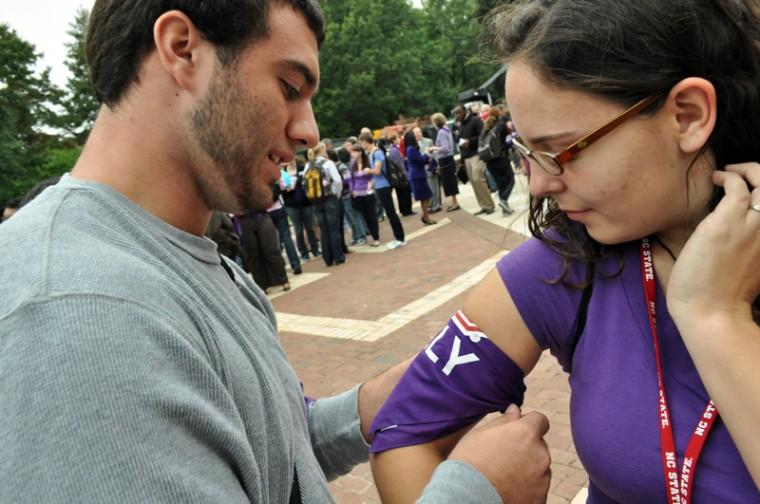 " />
" />
© NCSU Student Media 2011
Kenny Hertling, a freshman in political science, helps Alicia Moreira, a junior in English and philosophy, with her purple ally band at the GLBT rally in the Brickyard Oct. 20. "My older sister is a lesbian and works on campus and I love her death and will support her every step of the way," Hertling said. Photo by Alex Sanchez
After the historic repeal of the Don’t Ask, Don’t Tell policy, President Obama is making history again by calling into question the constitutionality of the Defense of Marriage Act.
Throughout his campaign, Obama said he supported civil unions but not marriage for homosexual couples.
But now, according to CNN, Obama has ordered the Justice Department to stop defending the constitutionality of the Defense of Marriage Act, which defines marriage as between a man and a woman.
The Defense of Marriage Act, or DOMA, was enacted in 1996 during Bill Clinton’s administration. It not only defines marriage as being strictly heterosexual, but it also says that states do not have to recognize same-sex marriages from other states.
After DOMA became law, many states, including NC, came up with their own laws that reinforced it—that they would not recognize same-sex marriages from other states.
“It gave the government a way out and gave the ‘ownness’ back to the states as far as what they wanted to recognize from other states,” Justine Hollingshead, director of the GLBT Center, said.
Obama has cited “a documented history of discrimination” for his position on the law, according to Attorney General Eric Holder.
Hollingshead said Obama’s statement is a good start for equal rights of the GLBT community.
“It’s still a law, but they are not going to actively defend it anymore,” Hollingshead said.
She also said it means the government is taking steps to stop being actively discriminatory.
“When you force someone who is an attorney or a judge to put aside their personal beliefs, and make them look at the law itself, they can’t defend it anymore because it violates the basic rights,” Hollingshead said. “When you look at DOMA and the Constitution, they are in direct violation of each other.”
This new development calls into question a bill in North Carolina, Senate Bill 106, or “the anti-gay amendment” as opponents refer to it.
The bill would amend the state constitution to define marriage as being between a man and a woman, which is a much bigger step from simply having a law that states the same thing.
“You would normally amend a constitution to grant rights, not to take away rights,” Hollingshead said.
Not only would the bill prevent same-sex marriage, but it would also bar same-sex couples from civil unions or domestic partnerships, while also taking away benefits like health insurance to same-sex couples and unmarried heterosexual couples.
“As a society we are moving away from the traditional definition of marriage. It’s a civil contract between two people. So whether it’s between two men or two women or a man and a woman, it’s a civil contract,” Hollingshead said.
She added that people tend to not understand that being married legally grants couples many rights and privileges, including tax breaks and health insurance.
“People don’t realize that with getting married as a heterosexual couple, it comes with over 1,000 rights … from inheritance and health care, to protections if you get hurt or sick,” Hollingshead said.
This bill, as well as DOMA, forces the GLBT students of the University to think about their futures many years before they plan to even think about marriage.
“Heterosexual students don’t think about it because they can get married if they want to,” Hollingshead said.
Many students support Obama’s claim that DOMA is unconstitutional and believe questioning it is a step toward equality.
“I think it’s about time. With the repeal of DADT, that was the next thing to go. It shouldn’t have lasted as long as it did,” Allison Smiddy, a junior in archeology, said.
Megan McLaurin, a freshman in animal science, said the act should have never been in place to begin with.
“We shouldn’t have had the discrimination to start with,” McLaurin said.
The students also believe this action will have a huge impact on the GLBT community in both the U.S. and the University.
“We are the next generation. We are the younger people, which means we get to set the tone to how younger generations below us react to this,” Derek Haynes, a junior in plant biology, said.
“Hopefully it will lead to a change to people’s opinions. We’ve seen people become a lot more open-minded. Maybe as leaders change their opinions, others will too,” McLaurin added.
Hollingshead said that part of the GLBT Center is to educate the community and advocate for equal rights in the community. And because this situation is an issue for the GLBT community, it presents opportunities for dialogue between groups.
“For us, it means educating people and advocating for the rights of all people,” Hollingshead said. “In an institution of higher learning, we are challenging people’s ideas.”
Overall, students hope that their rights won’t be taken away and that justice will be served.
“We are no different from any other community,” Haynes said. “We are the same and we deserve the same rights as everybody.”